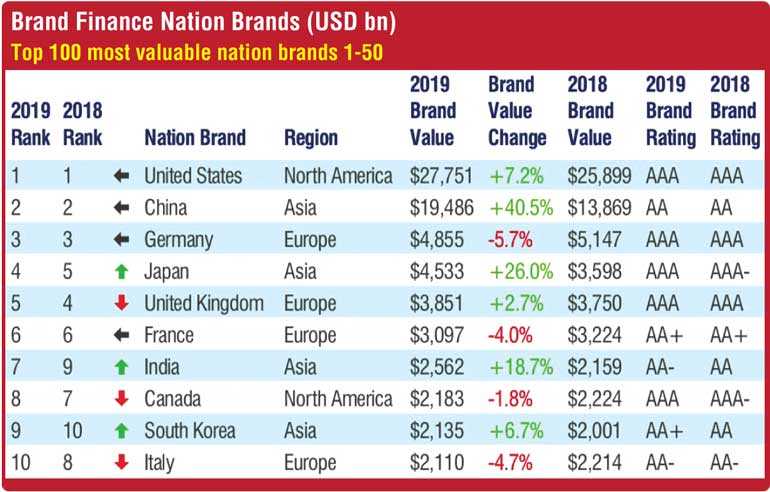Sunday Feb 15, 2026
Sunday Feb 15, 2026
Wednesday, 5 February 2020 00:10 - - {{hitsCtrl.values.hits}}

China’s economy will take a major hit due to the Coronavirus
China has been a trailblazer, growing at 40.5% in brand value over the last year. Believe it or not, the year-on-year net growth of brand China increased by $5.6 trillion dollars to $19.7 trillion. In contrast, the number one brand USA grew by just 7.2%, whereby the gap of $12 trillion in 2018 was reduced to $8 trillion in 2019. A simple extrapolation would mean that by 2020, the gap in brand value between the two countries would be just a $1 trillion.
China No. 1 by 2021
Given that China had six of the top ten financial institutions in the world and owns 137 global patents, China may have had the potential to become the No. 1 brand nation by 2021, grossing $35 trillion. But now this vision has been blown away by coronavirus. Was it a man-made disaster (biological attack) or was it natural, is the million dollar question in everyone’s mind. 
Why a strong brand?
It is said that a strong country has become a defining feature of success in today’s economic climate. Worldwide hyper-competition for business combined with an increasingly cluttered media environment means that a clear country brand tends to have a competitive advantage in attracting business, tourism and driving exports into global markets – which is where China was headed, to potentially become the world’s superpower brand by 2021.
China – an economic powerhouse
In today’s intensely competitive world, where access to capital, talent, ideas and consumers gets ever easier, countries’ ability to compete against each other for a share of mind, income, talent and voice is significantly determined by the power of their brand image. China, with its strong multi-pronged attack, from new products – 137 patents –, laying claim to top six financial institutions, the strategic presence of the ‘Silk Road’ – owning 40% of the Karachchi Stock Exchange to the Hambantota Port in the south of Sri Lanka where almost 70% of global ship traffic will pass through – tells us of China’s strategic thinking and how sharp its global image is as an economic powerhouse.
Sharp image
Let’s accept it – unless a country “stands for” something special and different, there is little chance that it will be able to compete successfully for any of the precious attention. A specialist who advises governments on building strong country brands states that, like any brand, nations have individual identities which are unique to them and that no two nations are alike, which is why Sri Lanka needs to agree on clear positioning and then drive a global campaign like Thailand, Singapore and Malaysia are doing, so that we communicate a unique identity, and then very importantly live it, so people can feel the brand when they come to our beautiful Island.
Is China’s brand hurt?
Nation after nation around the world have restricted or forbidden their national carriers to fly to China. Some countries have closed their borders or demand health records before allowing foreigners to enter. Depending on how the virus mutates and spreads, the consequences of these cancellations might last for years in my view. Which will surely impact the $19.7 trillion brand.
The results are not only a loss of money but also of prestige and reputation. Many parts of China already suffer from a perceived lack of hygiene and the spread of this virus has made a bad situation appear even worse. Additionally, we live in an age of 24-hour, seven-days-a-week worldwide news. The result is that what happens in one location around the world is almost instantaneously known throughout the entire world.

China’s tourism
The large scale reluctance to travel to China could result in lower numbers of people flying and decrease its lodging occupancy, resulting not only in the loss of income but also of jobs. Due to decreasing taxes being paid, the government will have to find new revenue streams or be faced with having to cut social services. The loss of reputation and confidence on the part of the traveling public would make a colossal impact on the Chinese economy.
Brand Japan $2.7 trillion and tsunami
Let me cite an example. Japan captured the world’s imagination with cutting-edge innovation amidst challenging economic conditions and developed brands that dominated the world, from the Sony Walkman to power automotive brands like Toyota, Mitsubishi, Honda, Nintendo, Canon and Nissan, to just name a few, not forgetting the b2b brand like NTT that cut across the world of telecommunication. In fact, at one time the number three economy in the world had 10 of the top 15 most powerful brands in the world. By 2011 Brand Japan was estimated to be worth a staggering $2.6 trillion.
However, Japan’s reputation as a safe and efficiently-governed country that powers innovative consumer durables stuck disaster when multiple natural disasters hit the country. The 11 March 2011 earthquake and the subsequent tsunami that killed 15,000 people were also a massive hit on the country’s infrastructure and exposed the country’s weak leadership and inability to respond to challenges. The tsunami and accompanying nuclear disaster caused all ports in the country to be closed, immensely disrupting economic supply chains. The national brand lost $679 billion and ended with a low $1,940 billion value, which demonstrates the fragility of this indicator where losing the confidence of the world results in severe ramifications.
Takeaway for Sri Lanka
Given the experience of Brand Japan and what is unfolding in China, Sri Lanka needs to understand the ramifications from the economic fallout of China and its impact on the tourism, export manufacturing material and Chinese merchandise that keep Sri Lanka’s economy ticking. A quick directional change will have to be done for alternative sourcing given that Sri Lanka has become a lead nation for the management of the Coronavirus.
(Dr. Athukorala is an Alumnus of Harvard University Executive Education and works for an Artificial Intelligence company based in Sri Lanka. The thoughts shared have no link to the organisations the author serves in Sri Lanka or in the South Asian region.)